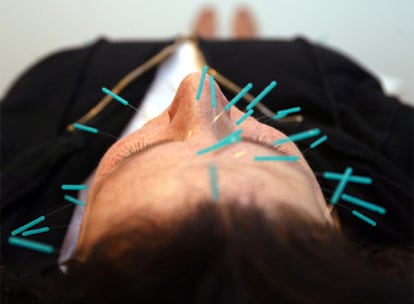Can homeopathy and acupuncture help patients with Parkinson’s?
Acupuncture is not a substitute for treatment; homeopathy is just a lie. This is what you need to know about these alternative therapies

First of all, there is no single answer to the question, as acupuncture and homeopathy are two very different fields. Regarding homeopathy, the answer is an emphatic no. People call homeopathy a pseudomedicine (false medicine) or pseudoscience, but in my opinion, the terms “medicine” or “science” should not even be part of the definition. What homeopathy does is fool people. Homeopathic compounds contain – if after all the dilutions there is still a molecule there at all – an infinitesimal amount of the active ingredient. We are talking about the dilution of a dilution of a dilution of an active ingredient. Homeopathy is based on three alleged scientific assumptions, but there is really no science there at all: what is similar cures what is similar – in other words, at minuscule doses, a substance that causes symptoms similar to the disease in healthy people will be an effective therapeutic agent in sick people. The second principle is that of dilutions and dynamization.
In homeopathic products, terms like 3C, 10C, and so on, refer to the degree of dilution. After countless dilutions, practically nothing remains of the alleged active ingredient. This is where the third principle comes in: water memory. Homeopaths argue that the water of the initial tincture (known as mother tincture) in which these solutions are made remembers the active ingredient, that is, that the water can physically recall the chemical properties of the substances that have been diluted in it, apparently forever. The experiments that have been done, and published, to prove water memory, have been later proved to be erroneous and careless.
In conclusion, homeopathic compounds do not cure diseases such as Parkinson’s. They rely on the placebo effect and, quite often, on the distress of sick people and their urgency to find a something that will heal them.
Acupuncture is a completely different matter. There are clinical trials – that is, scientific evidence – that show that, together with the different treatments used for Parkinson’s, acupuncture can actually produce some improvement. However, the metastudies that have been carried out for these clinical trials are insufficient. Much more rigorous analyzes are needed, like the double-blind method, a system used to guarantee that clinical trials produce real results. In it, neither those who carry out the research nor those who participate in the trial know if what the patients are receiving is the drug or the placebo. This is a way to avoid biases in the interpretation of the results, and it is easy if the treatment to be tested is something like a pill, but if we are talking about acupuncture, then it is much more complicated. There have been attempts where the acupuncturist performs fake acupuncture to some of the participants, but the acupuncturist does know whether they are using real or fake acupuncture.
In addition, another aspect to consider is that Parkinson’s is a chronic disease, and what the trials have determined is the immediate relief produced by acupuncture. Whether this works in the medium and long term, it has not been studied. That is why meta-analyses on these clinical trials have to be more rigorous and include more people. But they have found that acupuncture, together with current treatments, does seem to help alleviate some of the symptoms of Parkinson’s. Nonetheless, it is of great importance to be aware that acupuncture cannot, under any circumstances, replace treatment.
Parkinson’s is a neurodegenerative disease. It occurs when neurons do not produce enough of a neurotransmitter called dopamine. It mainly affects movement; its symptoms are tremors, stiffness, slowness of movement and some balance problems. It is estimated that it affects between 1% and 2% of the population over 60 years of age, and up to 5% of the population over 65 years of age. There are treatments to alleviate the symptoms, but we do not have a definitive cure.
Nuria E. Campillo is a senior researcher at the Margarita Salas Center for Biological Research of the Spanish National Research Council and works on the development of neuropharmaceuticals for diseases such as Parkinson’s, Alzheimer’s or ALS.
Tu suscripción se está usando en otro dispositivo
¿Quieres añadir otro usuario a tu suscripción?
Si continúas leyendo en este dispositivo, no se podrá leer en el otro.
FlechaTu suscripción se está usando en otro dispositivo y solo puedes acceder a EL PAÍS desde un dispositivo a la vez.
Si quieres compartir tu cuenta, cambia tu suscripción a la modalidad Premium, así podrás añadir otro usuario. Cada uno accederá con su propia cuenta de email, lo que os permitirá personalizar vuestra experiencia en EL PAÍS.
¿Tienes una suscripción de empresa? Accede aquí para contratar más cuentas.
En el caso de no saber quién está usando tu cuenta, te recomendamos cambiar tu contraseña aquí.
Si decides continuar compartiendo tu cuenta, este mensaje se mostrará en tu dispositivo y en el de la otra persona que está usando tu cuenta de forma indefinida, afectando a tu experiencia de lectura. Puedes consultar aquí los términos y condiciones de la suscripción digital.








































